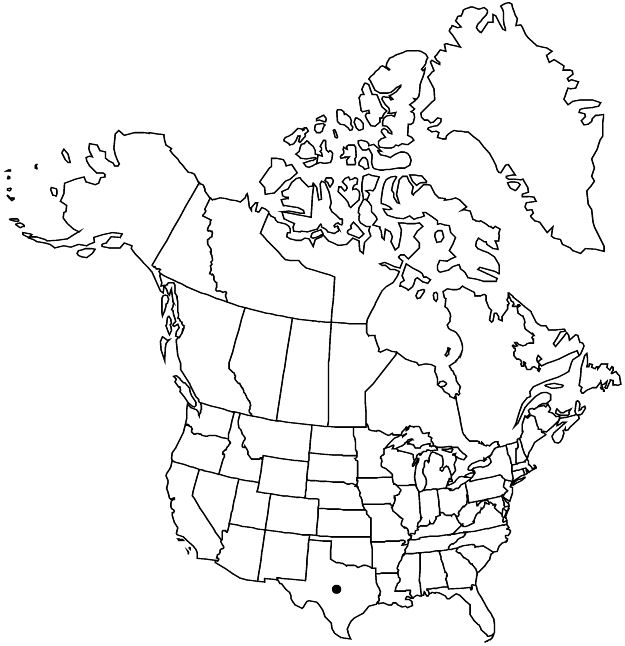Difference between revisions of "Argythamnia aphoroides"
Linnaea 34: 146. 1865. (as Argyrothamnia)
FNA>Volume Importer |
imported>Volume Importer |
||
| (6 intermediate revisions by 2 users not shown) | |||
| Line 6: | Line 6: | ||
|place=34: 146. 1865 | |place=34: 146. 1865 | ||
|year=1865 | |year=1865 | ||
| + | |other_info_on_pub=(as Argyrothamnia) | ||
}} | }} | ||
|common_names=Hill country silverbush | |common_names=Hill country silverbush | ||
| Line 19: | Line 20: | ||
|name=Ditaxis aphoroides | |name=Ditaxis aphoroides | ||
|authority=(Müller Arg.) Pax | |authority=(Müller Arg.) Pax | ||
| + | |rank=species | ||
}} | }} | ||
|hierarchy=Euphorbiaceae;Argythamnia;Argythamnia aphoroides | |hierarchy=Euphorbiaceae;Argythamnia;Argythamnia aphoroides | ||
| Line 34: | Line 36: | ||
|elevation=300–600 m. | |elevation=300–600 m. | ||
|distribution=Tex. | |distribution=Tex. | ||
| − | |discussion=<p>Argythamnia aphoroides is restricted to the Edwards Plateau.</p> | + | |discussion=<p><i>Argythamnia aphoroides</i> is restricted to the Edwards Plateau.</p> |
|tables= | |tables= | ||
|references= | |references= | ||
| Line 43: | Line 45: | ||
-->{{#Taxon: | -->{{#Taxon: | ||
name=Argythamnia aphoroides | name=Argythamnia aphoroides | ||
| − | |||
|authority=Müller Arg. | |authority=Müller Arg. | ||
|rank=species | |rank=species | ||
| Line 58: | Line 59: | ||
|publication year=1865 | |publication year=1865 | ||
|special status=Endemic;Conservation concern | |special status=Endemic;Conservation concern | ||
| − | |source xml=https:// | + | |source xml=https://bitbucket.org/aafc-mbb/fna-data-curation/src/2e0870ddd59836b60bcf96646a41e87ea5a5943a/coarse_grained_fna_xml/V12/V12_454.xml |
|genus=Argythamnia | |genus=Argythamnia | ||
|species=Argythamnia aphoroides | |species=Argythamnia aphoroides | ||
Latest revision as of 19:15, 5 November 2020
Herbs, perennial, monoecious or dioecious, to 5 dm. Stems erect to ascending, hairy, hairs malpighiaceous. Leaves: stipules deciduous, linear-lanceolate, to 1 mm, margins not glandular; petiole absent; blade elliptic, 1.5–4 × 0.6–2 cm, margins entire, without glands, surfaces hairy, hairs malpighiaceous. Inflorescences unisexual, 3–8 cm; bracts linear-lanceolate, 2–4.5 mm, margins without glands. Flowers without pink dye when wetted. Staminate flowers: sepals lanceolate to narrowly elliptic, 4–5.5 × 1.1–1.4 mm; petals cuneate-elliptic to cuneate-obovate, 3.3–4 × 1.6–3 mm, free from androphore; nectary glands oblong, 0.4–0.5 × 0.3–0.4 mm, adnate to androphore, glabrous; stamens 10, staminodes 0. Pistillate flowers: sepals lanceolate to elliptic, 6–7 × 1.7–3.2 mm, without glands; petals 0 or 5, linear, 0–1.7 mm; nectary glands oblong, 0.5 × 0.7 mm, glabrous; ovary tomentose to lanulose; styles 1.5–3 mm, tomentose; stigmas flattened. Capsules 7–9 mm, tomentose to lanulose. Seeds 3.7–5 mm, smooth, lightly tuberculate, or striate.
Phenology: Flowering Jan–Jul.
Habitat: Bluestem-grama grasslands, oak woodlands, calcareous, often rocky, clay or loam soils.
Elevation: 300–600 m.
Discussion
Argythamnia aphoroides is restricted to the Edwards Plateau.
Selected References
None.
